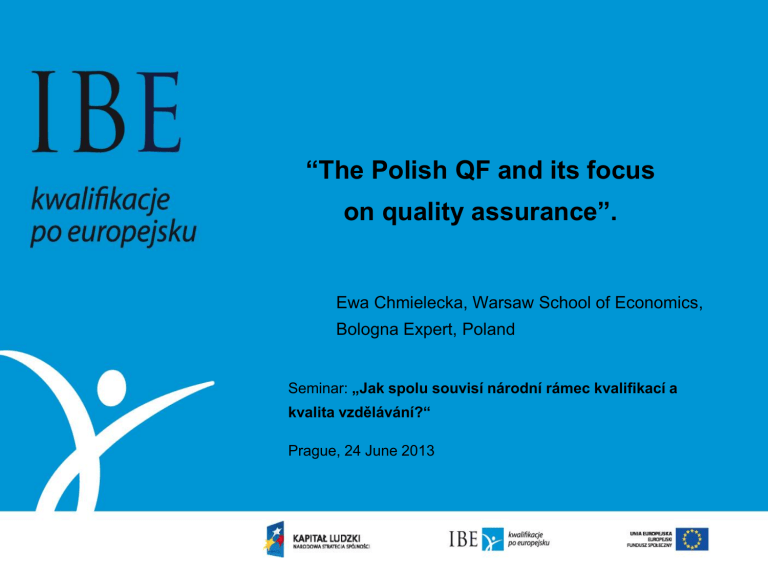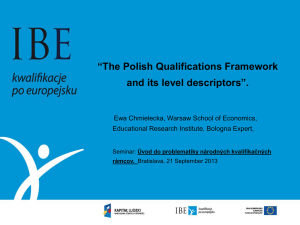Polska Rama Kwalifikacji w kontek*cie zmian na wspó*czesnym

“The Polish QF and its focus on quality assurance”.
Ewa Chmielecka, Warsaw School of Economics,
Bologna Expert, Poland
Seminar: „Jak spolu souvisí národní rámec kvalifikací a kvalita vzdělávání?“
Prague, 24 June 2013
Contents
Intention:
to present the Polish QF for HE case as an example of good (?) practice answering the question of QF and quality assurance
– Structure of the PL QF
– Systems of quality assurance in context of PQF
– Example: changes in the PL higher education
2
The scope and structure of the Polish QF (PQF)
8 levels. Three categories of level descriptors: knowledge, skills, social competences.
In the PQF: 2 categories of level descriptors by their degree of detail
universal (first stage)
typical for different types of education (second stage).
Possible third stage generic descriptors (e.g. in sectors, HE).
Covers all types qualifications
Full qualifications
Partial qualifications
3
Key aspects of the comprehensive description of LO
Scope
Knowledge
Depth of understanding
Problem solving and applying knowledge in practice
Skills
Learning
Communication
Identity
Social competence
Cooperation
Responsibility
Completeness of the cognitive perspective
Dependencies
Complexity of the problem
Innovation in the approach
Independence of actions
Conditions under which one acts
Independence
Methods
Scope of expression
Complexity of expression
Participation
Sense of responsibility
Conduct
Team work
Conditions under which one acts
Leadership
Consequences of one’s own actions
Consequences of the team’s actions
Evaluation
4
Structure of the Polish Qualifications Framework
5
Qualifications awarded in the Polish education system below higher education
(children and youth) elementary school certificate of completing elementary school lower secondary school certificate of completing lower secondary school certificate of completing basic vocational school basic vocational school vocational certificate vocational diploma certificate of completing the upper secondary technical school upper secondary technical school vocational certificate vocational diploma
1
2 not yet determined
3
3 not yet determined
3 or 4 depending on the qualification
4 general upper secondary school matura certificate certificate of completing general upper secondary school matura certificate
4 not yet determined
4 6
Qualifications awarded in the Polish higher education system
Type of studies: Name of qualification ECTS credits
Planned qualification level in the PQF first cycle studies
(Bologna first cycle) diploma certifying the professional title of licencjat /inzynier or equivalent title at least 180 6 second cycle studies – at least
90 second cycle studies (Bologna second cycle) or long cycle studies diploma certifying the professional title of magister /magister inżynier or equivalent title (e.g. physician) long cycle master degree studies: at least 300 (5 year studies), 360
(six year studies)
7 third cycle studies
(Bologna third cycle) additionally: postgraduate nondegree studies
diploma certifying the academic degree of doktor in a specific discipline certificates of completion of postgraduate non-degree studies
45-60 8 at least 60; (the studies should not be less than two semesters) depending on the programme
7
Learning outcomes in the PQF
(PQF/EQF referencing criterion 3 on LO)
All qualifications in the PQF (in the Q-register) have to be described in the terms of learning outcomes (knowledge, skills, social competences).
In the GE and formal VET learning outcomes principle are included in core curricula, implemented by law.
In GE and VET learning outcomes define also examination standards
In HE learning outcomes and their validation must be described for the study programmes of specific fields in the eight broad areas of study
This is under control of QA systems
In non-formal sector application of LO not very common
8
Expectations concerning the PL QF– learning outcomes orientation
• General
– transparency,
– comparability,
– Quality assurance enhancement
– building mutual trust (national and international aspect)
– openness for stakeholders
– better fit for labor market needs
– LLL driver
– ….
9
Expectations [2] concerning the PL QF for HE – learning outcomes orientation
Increased autonomy of HEIs
– Diversification of HEIs
– Variety of programs, methods ..
But
Comparability of programs by common points of reference
– Not content based
– Assigning qualifications (diplomas) to levels
– Protecting quality
10
Qualifications Framework
And
Quality Assurance case of the PL higher education
11
The hierarchy of learning outcomes
12
8 broad areas of study
Based on the descriptors of PQF typical for higher education the descriptors for eight broad areas of
study and two profiles have been developed on the national level (first and second cycle)
1. Humanities
2. Social sciences
3. Exact sciences
4. Life sciences
5. Engineering and technology
6. Medical sciences and health sciences
7. Agriculture, forestry and veterinary sciences
8. Fine arts
Main force to implement PQF for HE
Competent
Independent
Highly motivated
Accreditation Body
• Polish Accreditation Committee has been involved in development of QF for HE from the first meeting of the Working Group on QF for HE in 2006.
The advice given by Bologna Experts
Actions undertaken by the Ministry for Science&HE
The role of quality assurance body
The Polish Accreditation Committee is required to perform a qualitative assessment of how higher education institutions are implementing educational regulations.
Amendments to the Act on Higher Education of March 2011 required that the PAC include the process of qualifications framework implementation in its assessment process of higher education institutions.
The PAC is a member of the European Quality Assurance Register, which means that it complies with the European Standards and Guidelines for
Quality Assurance for Higher Education.
The PAC prepared to fulfill this task by adopting the appropriate resolution
15
The PL QF HE implementation [1]
• Context 1: expected reluctance of the academic community
• Context 2: enlarging autonomy in curricula design
• Context 3: expected difficulties with “learning outcomes” approach
Training:
More than 2 5 0 seminars, workshops, conferences provided in 200 8 -2012 (and still continued) by
– Ministry of Science &HE
– Bologna Experts Team
– Projects of the Human Capital Development Program
„converted seminars”
„millionaires” competition
QF Advisors
• In total - about 18 000 of academic workers participated in the training
• „cascade” training system at HEIs .
16
The PL QF HE implementation [2]
Websites:
– the ministry of HE,
– the Bologna Experts,
– Institute of Educational Research
publications :
– 3 PL books,
– many other issues
– Translations: like German “Yes, go!”
Strong support given by the rectors conferences and other HE bodies
Exceptional financial support on base of the European funds
17
The PL QF HE implementation: first results
• Implementation of LO approach (end of the 2012/13 academic year):
• expectation concerning the academic community resistance – confirmed
• but the most of results quite promising
– New curricula and syllabi prepared and well established in all
HEI for level 6 and 7 , corrected this year with much better understanding.
– Post-diploma and PhD studies curricula under reconstruction
– New degree programs – opportunities taken from enlarged autonomy – breathtaking!
– Much better understanding the PQF significance, profits, other aspects :
• „I have in hand all necessary tools for individualization of studying I am implementing now” .
18
Thank you for your attention!
19







